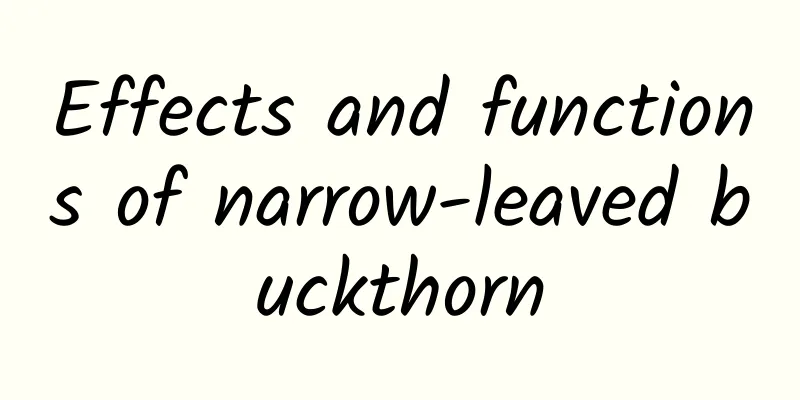Effects and functions of narrow-leaved buckthorn

|
There are many types of Chinese medicine. When we choose, we need to understand the medicine first. So do you know about the medicinal material Rhamnus narrow-leavedus? Let us introduce it below. [Other names] Tea tree, black tea, tea [Source] Medicinal material source: The leaves of Rhamnaceae plant Rhamnaceae. [Original form] Rhamnus serrata, shrub, rarely tree, up to 2m tall. Many branches, branches reddish brown, glabrous, with thorns at the top. Leaves are alternate or clustered on short branches; petioles are 3-15mm long, glabrous or with fine hairs; stipules are awl-shaped and fall off early; leaves are papery, linear or linear-lanceolate, 3-8cm long, 3-10mm wide, with acute or obtuse apex, cuneate base, sparsely serrated margins, and glabrous on both sides. The flowers are unisexual, dioecious, and yellow-green; 10-20 male flowers are clustered at the ends of short branches, broadly bell-shaped, with triangular sepals that are nearly the same length as the calyx tube; female sepals are narrowly lanceolate, twice as long as the calyx tube. There are reduced stamens, ovary 2-3 chambers, long style, 2-lobed or half-cleft. The drupe is spherical, 5-6mm in diameter, black when ripe, with a persistent calyx tube at the base. The seeds are obovate, with longitudinal grooves on the back and are light brown. The flowering period is May, and the fruiting period is June-July. [Habitat distribution] Ecological environment: Grown in arid sand dunes, barren slopes, rocks or bushes at an altitude of 1000-2100m. 【Nature and flavor】 Sweet; Cold 【Functions and indications】 Clears away heat and relieves restlessness; helps digestion and resolves stagnation. Mainly used for persistent low-grade fever; irritability and thirst; indigestion; diarrhea [Usage and Dosage] For oral use: decoct in water, 15-30g; or brew with boiling water as tea. 【Excerpt】 Chinese Materia Medica Having said so much, we can see that narrow-leaved buckthorn has many uses. It can also be used as medicine to treat diseases. You might as well know more about these, it will be helpful in your life. |
<<: The efficacy and function of the East China membrane fern
>>: The efficacy and function of palm crab grass
Recommend
What are the benefits of Lingzhi to the human body?
Ganoderma lucidum is also known as Ganoderma luci...
Aspartame's "possible carcinogenicity" controversy continues, why do we have such a special liking for sweetness?
On July 14, 2023, the assessment report on the he...
The efficacy and function of puffer fish
Puffer fish is a common type of traditional Chine...
What are the traditional Chinese medicines that can nourish the kidneys and strengthen yang?
There are many ways to nourish the kidneys and st...
Nutritional value of chicken head rice
Chicken head rice, which we call water chestnut i...
The efficacy and function of small white ginseng
Speaking of small white ginseng, I believe many f...
How do scientists search for extraterrestrial life? What conditions are needed for life to develop into a first-level civilization?
Because life only exists on Earth now, the extrat...
The efficacy and function of Albizzia julibrissin
In ancient times, the Albizia Julibrissin was onc...
What are the Chinese medicine formulas for nourishing kidney yin deficiency?
Kidney deficiency is a common symptom in life. It...
The efficacy and function of pumpkin stem
Pumpkin stem is a traditional Chinese medicine. D...
What are the effects and functions of Eucommia Carbon?
Eucommia carbon is a common Chinese medicinal mat...
When children have cough and fever, in addition to influenza and mycoplasma, you should also be alert to these viruses!
Children are prone to respiratory infections in w...
The efficacy and function of blue flowered Meconopsis
After thousands of years of sedimentation and acc...
The efficacy and function of a flag
Yizhiqi is a famous traditional Chinese medicinal...
The efficacy and function of long hair euphorbia leaves
Only when we understand the main ingredients of a...









